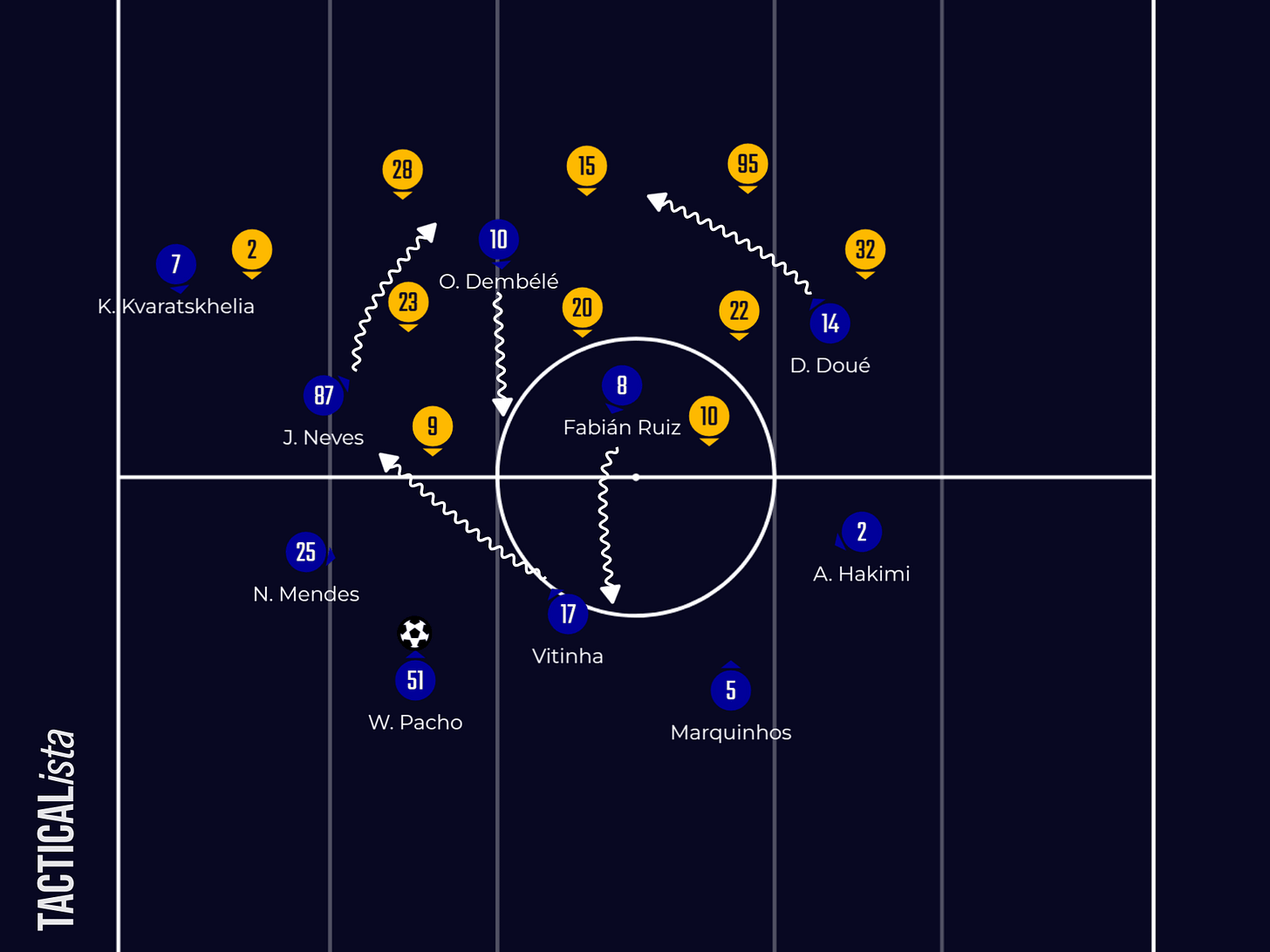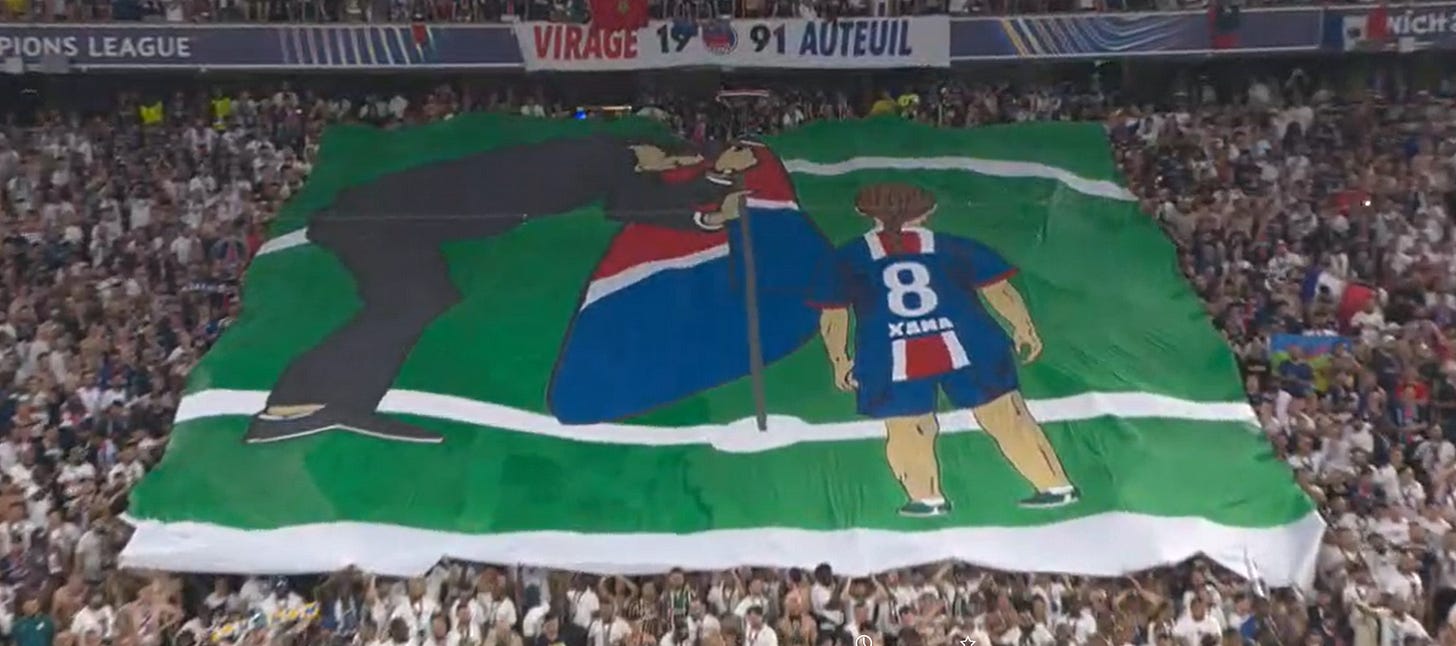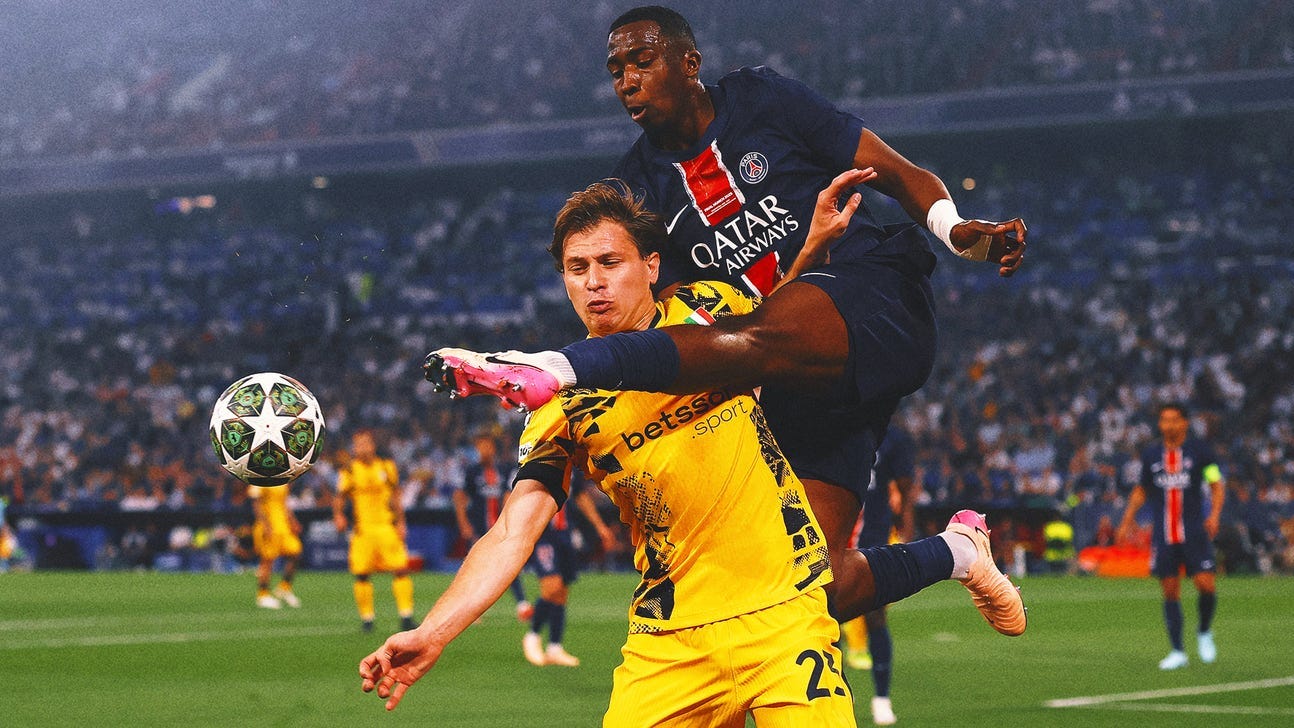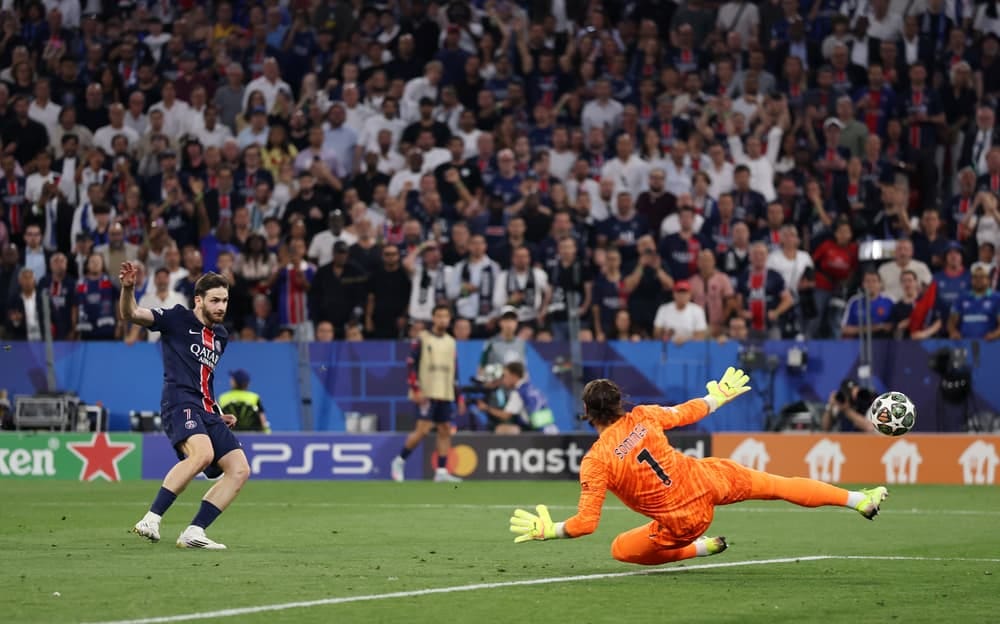Quick thoughts from...the 2025 Champions League final
A clash of ideologies, honouring Luis Enrique's daughter, and one of the most dominant performances in history.
I did not intend to write this Quick Thoughts originally as I am aware that there will be an endless number of articles being written about this match from different angles. But looking back at the articles that I wrote for the 2024-25 season and realising that I started my return journey to regular blogging by covering the league phase of the Champions League, I thought it would be nice to end this season with the competition that I started. And thus, this will the last Quick Thoughts edition of the 2024-25 season. Don’t worry, the series will definitely return when the 2025-26 season begins and maybe depends on whether I want to spend my Australian winter covering the Club World Cup and international matches or not.
The 2025 Champions League final had something a bit odd about it because it was a clash between a French team and an Italian team, the first to happen since the 1993 final between Olympique de Marseille and AC Milan where Marseille triumphed by a single goal to become the first French team to win the competition after its rebranding. It was also the first final since the 2004 final between AS Monaco and FC Porto to not be contested by at least an English, Spanish, or German team, which was a breath of fresh air during an era where English and Spanish football have dominated the European tournaments.
A clash of ideologies
But even with that oddity, it is hard to say that either team did not deserve to book their place at the München Fußball Arena (the fancier, less-sponsored version of the Allianz Arena). On one side, Paris Saint-Germain were one of the best teams throughout the tournament and their improvement under Luis Enrique had been a joy to watch. Ignoring their off-field shenanigans, they went from being known as a “team of superstars” to actually played like an actual team through sensible signings and sparkled in a bit of star power.
I did watch their first two matches in the league phase against Girona and Arsenal, which you can still find my thoughts about both matches through the embedded links. Quoting my conclusion after their 2-0 loss against Arsenal:
Meanwhile, PSG still felt like they lacked something to be considered as one of the favourites to win the Champions League. Without Kylian Mbappé this season, Enrique has the opportunity to build an actual team, but so far what they have done have not given them enough to compete at the biggest stage of European football.
I am very happy to be wrong about my conclusion on PSG because Enrique has done an amazing job improving the team by making changes to how they played. The foundation of a possession-based style is still there, but the thing that made them so fun to watch during the second half of this season was their constant energy and the willingness to move the ball at almost any point of the game, and that was reflected throughout the final as well.
It is hard to find any point during the final where the PSG players tried to stop or slow the play down, and it felt like they played with an intention instead of aimlessly running or passing the ball around the back. Going up against Internazionale, a team who were defensively brilliant throughout the tournament and their highly disciplined 3-5-2 mid-block, it was always a challenge to find space to play through or around the block, yet PSG did find plenty.
Their constant rotation in midfield and up front dragged Inter players out of their position on many occasions, which opened up spaces for them to play through the block and enter the final third with ease. PSG started with a midfield three in the order of Vitinha (#6) - João Neves (left #8) - Fabián Ruiz (right #8), but they hardly stayed in that order on many occasions because they were constantly moving and swapping positions with each other. Minutes earlier, I spotted Vitinha dropping in between the centre-backs, Neves positioning inside the left half-space, and Fabián lurking up front with Ousmane Dembélé. Yet, not long after, I then spotted Fabián in between the centre-backs, Vitinha in between Inter’s defensive lines, and Neves inside the right half-space.
The same thing happened with the front three as Khvicha Kvaratskhelia (left winger) - Dembélé (front #9) - Desiré Doué (right winger) did not maintain this order a lot of the times. Kvara and Doué could be spotted occupying the false #9 role while Dembélé roamed from his position and drifted to the left or right winger spot to help with the play. I cannot stress this enough, but that kind of rotation happened constantly throughout this season for PSG and this final was not an exemption, which was also the crucial tactical aspect that helped PSG unlocked Internazionale’s well-organised defence.

I also have to give the flowers to Simone Inzaghi’s team for their performance this season and for getting to their second UCL final in three years. Their journey to the final was a bit different to PSG’s since they did not dominate the game and the ball like the French side, but rather relied on a solid defence, counter-attacks, and dominate set pieces. But on a day where PSG played an amazing game, it was hard for the Italian side to pull off any surprises like they did against Bayern München and Barcelona.
Honouring Xana

A few days before the final, The Athletic published an article about Luis Enrique and his daughter, Xana, who had passed away in 2019. The infamous image of the Spanish coach and his daughter planted a Barcelona flag at the Olympiastadion in Berlin after he had won the 2015 final with the Catalan side still remained iconic. But it was iconic not just because it was a touching moment between a parent and their child, but also because of the story behind it.
The article was moving, to say the least, and the story felt pretty much the same. It resonated with me because of how Enrique’s emotions and what he expressed whenever he was asked about Xana. I am not of the authority to say or judge anything because I am merely a fan and someone from the outside looking in. Still, I felt Enrique’s positivity shone through, of how glowing he described his daughter, of how he appreciated the time that he got to spend with her, and, of how he is still carrying her wherever he goes. “The star that guides our family”, he said. It is beautiful because of how Enrique still saw the positives even during the darkest of times and how he kept himself motivated to continue and carry on with Xana in his heart.
I am not someone who conveys and describes emotions very well, so I do not think I am doing a good job of paying tribute to Enrique and his family. But I still want to leave this section to honour Xana and the tifo above that PSG fans demonstrated after the match because it was a beautiful gesture. A decade on from the Berlin final, Enrique returned to Germany for another Champions League final, still carrying his daughter with him, and he had won it again for her.
A performance for the history books
Given the contrast in both teams’ style of play, it was not a surprise when PSG were considered as favourites heading into the final. But I doubt many would have thought the French side would produce a dominant performance like that and came out with a performance that put them into the competition’s history books.
As the match went on, however, it definitely felt like the match was heading towards such outcome. Inter just could not get anywhere close to the ball and they were left chasing it for the majority of the match. The possession stats backed that, with PSG controlled 62% of the ball in the first half and 55% in the second half. As mentioned earlier, the French side controlled a lot of the ball but they played with intention instead of aimlessly moving the ball around, which helped them create very good goal-scoring chances.
I cannot go without acknowledging the brilliant performance from Desiré Doué, especially in the first half. A lot of PSG’s attacks went down his right-hand side with Hakimi involved every now and then, and he played with the level of confidence like this was just a normal league match. His dribbles created a ton of problem for Federico Dimarco and Alessandro Bastoni, while his pace was very effective whenever PSG had a counter-attack.
I also have to give credits to Kvaratskhelia and Doué’s willingness to defend because that was not something that I had grown to be familiar to see at PSG. They both showed great work rate to track back, regroup, and defend with the rest of the team, which made them into a stronger collective out of possession. Even though Inter were the team known for their defence, I felt PSG were the better ones out of possession, especially considering the fact that the Italian side did not create too many chances towards Gianluigi Donnarumma’s goal (0.3 xG created, 0.26 xG from open play, 0.05 xG from set play), and most of their chances came from corners.
Mark Carey brought up a good point about Inter in The Athletic FC/Tifo Football’s post-match breakdown. With Inter’s style of play prioritising sitting deep and frustrate their opposition, they would need their game state to go in their favour in order to play the football that they knew best, which was either a draw or the Italian side leading. That…only happened for about 12 minutes until Hakimi scored the opener, and with Doué’s goal came not long after, it pushed Inter into slight panic mode. With them not having a lot of the ball, unable to create many goal-scoring chances, and now being forced to play in an unfavoured game state, there was hardly any chance for Inzaghi’s side to find a way back into the final. It just felt inevitable at that point.
Wrapping up
An unconventional final and a clash of ideologies produced one of the most dominant (and maybe memorable?) finals in the Champions League and European Cup history. I am happy for Lucho (Luis Enrique), for what he has been through and for the work that he has done. I am also happy for the players who have worked hard to win the most prestigious trophy in club football.
But I am indifferent about seeing PSG winning the Champions League. At least there is one thing that I can take away from this final, that a team of individuals, no matter if they are the best of the best or not, still have a tough time winning trophies. It takes an actual team, a collective unit, and a clear strategy to achieve greatness.



